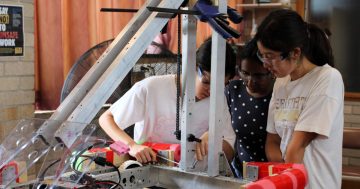Marcus Casey* says the focus should be on improving the quality of jobs generated in a future governed by technological change.
 How will technological change affect the quantity and quality of future jobs?
How will technological change affect the quantity and quality of future jobs?
It is difficult to know.
The issue of whether there will be enough jobs in the future receives substantial attention, mainly because of the well-publicised experiences of manufacturing workers whose jobs have been displaced by the introduction of robotics.
It also reflects a long-held societal anxiety that machines will replace us.
The consensus among most scholars, however, is that jobs are not going away.
Hence, rather than quantity of jobs, our focus should be on improving the quality of those jobs generated in a future governed by technological change.
That is, more effort should be directed toward making proper investments in training and education and adopting policies that will improve labour market institutions to ensure the jobs of the future pay well and provide employment security to workers.
How jobs are changing
Most occupations are expected to change in response to advances in automation and artificial intelligence (AI) protocols.
The existing empirical evidence suggests the jobs most at risk of substantial revision are those whose constituent tasks are sufficiently routine and structured to make them amenable to substitution by digital technologies.
In a recent paper by IBM Research and the MIT-IBM Watson AI Lab, the authors study how skill requirements in online job listings changed over the period 2010–17.
The findings suggest that tasks that are more suitable for machine learning and AI algorithms, such as scheduling and credential validation fell over the period.
At the same time, the authors found that listings featuring tasks that require human judgement, discretion, and other “soft skills” became more common.
More importantly, this latter skill set was associated with higher salaries, suggesting these skills were becoming more valuable in the market.
While these job listings data do not ultimately tell us much about what workers do, nor, because of their methodology, say much about less remunerated jobs such as personal care work, this research does identify some important dynamic features of these labour markets.
First, while jobs are changing due to technological adoption, they are changing relatively slowly, and, notwithstanding the special case of industrial robots in large manufacturing plants, there is little evidence of wholesale displacement in other sectors.
In addition, they also suggest the speed and scope of change at this point may allow us to make choices that better prepare workers for the labour market of the future.
Investing for the future of work
How do we use this information to help match workers with quality jobs?
Foremost, we need to provide better education and training models so that both current and future members of the workforce can acquire and develop skills that better complement technological change.
Workers without university educations will likely bear a disproportionate burden of technological change in labour markets and many will require reskilling and retraining.
Policymakers at the federal, State, and local levels can help.
Committing to investments aimed at standardising training systems should be a first-order concern.
Ensuring the availability of training options that both provide skills and credentialing in areas that fit employer needs through online platforms and on-the-job models that connect better to employer needs will be key to helping relatively older workers to compete for better jobs in the labour markets of the future.
Improving the education and training options for workers is only one component of the systemic changes needed to help workers navigate the labour market and attain quality jobs in the future work environment.
As a recent report by the MIT Task Force on the Work of the Future outlines, fostering a system that helps workers achieve quality jobs in the future will also require efforts to change other labour market institutions to better benefit workers.
Their suggestions to improve outcomes for workers include:
Incentivising innovation that enhances complementarity not substitution
Subsidies and other incentives should be shifted towards supporting innovation that complements and augments worker efforts, making them more productive.
This includes supporting investments in management capacity that will help employers know how to better integrate their workforce and investments in technology.
Reintroduce workers as stakeholders
The merits of pure shareholder capitalism are currently under litigation by many scholars in part because the system fails to account for the social costs imposed by its imperatives on workers and communities.
This occurs partly because of the decline in unions; workers rarely have a seat at the table.
Pushing firms to re-evaluate their institutional imperatives, coupled with more worker representation in decision processes, may potentially help contribute to workers sharing more in the benefits associated with increased productivity and increased economic dynamism that is promised by advances in technology and AI.
Ensuring a middle class in the future
We are unlikely to observe the end of work any time soon.
However, access to quality jobs that maintain or support upward mobility into the middle class will depend on the steps taken now.
As the technology underlying automation, digitisation, and AI advances, many middle-class workers will be at risk of the consequences of labour market disruption.
Investments that help workers enhance their skills and facilitate shared prosperity between workers and employers through improved labour market institutions should each be a part of the discussion going forward.
* Marcus Casey is Rubenstein Fellow at Brookings Economic Studies and Assistant Professor at the University of Illinois. He tweets at @MarcDCase
This article first appeared at www.brookings.edu/blog/up-front










